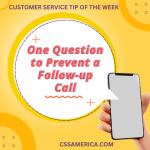 In too many local municipalities, when the call volume increases for the contact center, you simply hire more staff. When loud complaints arise, politicians make speeches echoing the community’s concerns. When the pipes burst, you create a laundry list of solutions without first identifying the root cause.
In too many local municipalities, when the call volume increases for the contact center, you simply hire more staff. When loud complaints arise, politicians make speeches echoing the community’s concerns. When the pipes burst, you create a laundry list of solutions without first identifying the root cause.
That last example of reaction in local government happened in Winnipeg recently. According to the article Customer service at Winnipeg city hall should be a priority for our new mayor, last winter’s occurrence of bursting pipes for local residents required reorganizing their 311 call center, better dealing with their infrastructure, and realizing that some things are just natural disasters.
But according to the article’s author, what really made the problem so exceptionally bad were factors including “The city failed to identify the problem soon enough, failed to notify homeowners about what they could do to prevent freezing, failed to acquire enough equipment and manpower to thaw pipes, and failed to provide affected homeowners with the help they needed in a timely manner.”
These are issues of lack of measurement, lack of proactive communication, lack of community education, lack of long-term planning/thinking, and lack of responsiveness. In short, it was poor customer service and a lack of a customer-focused culture. Our company has seen often with our clients (in public and private sectors) issues become far worse than necessary. The issues were difficult enough to address, but the reaction to the issue often exacerbates the problem. Organizations that don’t understand how to create an aligned culture focused on service and responsiveness get caught when the issues arise.
They don’t anticipate. They don’t empathize. They don’t react well or quickly. They don’t communicate proactively. They don’t succeed.
Sometimes great “PR” for a local government is not just about having an excellent communications department. Sometimes great PR is a direct result of a culture that’s great in the 1-on-1 Moments of Truth with their residents.
When seeking to improve relationships with the community, local city and county governments first need to ensure their culture is designed to succeed.
Did you like this post? Here are other Government-related posts:























